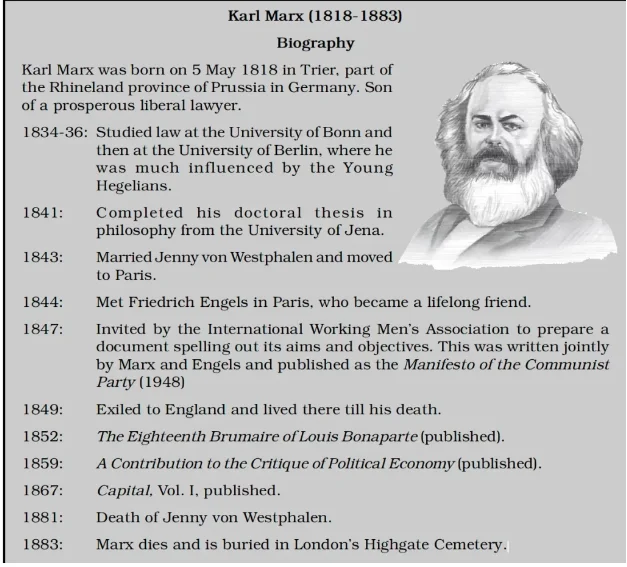The economic policies of British colonial rule in India were largely focused on exploiting the country’s resources for the benefit of Britain. While some early intellectuals hoped that British rule would bring modernization, they soon realized that the colonial system only deepened India’s poverty and economic dependency. Key figures like Dadabhai Naoroji and Karl Marx critiqued these policies for stunting India’s growth and promoting economic drain.
Nationalist Critiques and Economic Theories on Colonial India’s Exploitation
The Rise of Economic Nationalism in Colonial India
- Initial Support for British Rule: The early intellectuals of the first half of the nineteenth century initially supported British rule with the belief that it would modernize India through advanced technology and capitalist economic systems.
- However, as time progressed, disillusionment set in among the politically conscious individuals, leading them to scrutinize the true nature of British rule in India.
- Dadabhai Naoroji and the Economic Drain Theory: Dadabhai Naoroji, often called the ‘Grand Old Man of India,’ emerged as a prominent figure among these economic analysts.
- His comprehensive analysis of the colonial economy led to the formulation of the theory of economic drain, as presented in his work “Poverty and UnBritish Rule in India.”
- This theory highlighted the exploitation of India’s resources and wealth by the British.

- Notable Economic Analysts of the Period: Other notable economic analysts from this era included Justice Mahadeo Govind Ranade, Romesh Chandra Dutt (known for his work “The Economic History of India”), Gopal Krishna Gokhale, G. Subramaniya Iyer, G. V. Joshi and Prithwishchandra Ray.
- The Essence of Nineteenth-Century Colonialism: According to these early nationalist analysts, nineteenth-century colonialism’s essence lay in the transformation of India into a supplier of foodstuffs and raw materials for the British metropolis, a market for metropolitan manufacturers, and a field for the investment of British capital.
- Advocacy for Economic Self-Reliance: To address these issues, these intellectuals organized intellectual movements and advocated for the complete severance of India’s economic subservience to Britain.
- They proposed the development of an independent economy based on modern industries, striving for economic self-reliance.
Enroll now for UPSC Online Course
British Policies Making India Poor
- British Imperialism and India’s Poverty: The fundamental assertion made by these early intellectuals was that British imperialism was the root cause of India’s poverty, and that this impoverishment was a consequence of man-made factors that could be understood and remedied.
- They believed India’s economic backwardness was not an inherent condition but a result of British policies and exploitation.
- National Concerns and Economic Development: These intellectuals framed the issue of poverty as a matter of enhancing the productive capacity and vigor of the Indian population, effectively making it a national concern.
- This approach united various sections of society around common economic objectives.
- Moreover, they associated development with industrialization, emphasizing that industrial progress was the path to economic improvement.
- Advocacy for Indian-Capital-Based Industrialization: The early nationalists advocated for industrialization primarily based on Indian capital rather than foreign investment.
- They argued that foreign capital, instead of complementing and encouraging Indian capital, replaced and suppressed it.
- Political Consequences of Foreign Capital: This suppression led to economic drain, further strengthening British dominance over India.
- They also highlighted the adverse political consequences of foreign capital investments, as they contributed to political subjugation and vested interests that sought to secure foreign investors, thereby perpetuating British rule.
Growth of Trade and Railways to Help Britain
- Challenging British Claims of Development: These analysts challenged the British argument that the growth of foreign trade and the expansion of railways equated to development for India.
- Unfavorable Structure of Foreign Trade: They pointed out that the structure of foreign trade was unfavorable to India, positioning the country as an importer of finished goods and exporter of raw materials and foodstuffs.
- Railways and Commercial Expansion, Not Industrial Growth: The development of railways, they contended, was not aligned with India’s industrial requirements and primarily led to a commercial rather than an industrial revolution.
- Railways Facilitating Foreign Goods Dominance: According to these analysts, the railways ultimately facilitated the dominance of foreign goods over indigenous products.
- Benefits Flowing to British Industries: Moreover, they emphasized that the benefits resulting from the expansion of railways, such as increased steel production, machinery usage, and capital investment, primarily flowed to the British.
- G.V. Joshi’s Critique of Railway Expenditure: G.V. Joshi aptly summarized this by stating, “Expenditure on railways should be seen as an Indian subsidy to British industries.”
One-Way Free Trade and Tariff Policy
- Impact of One-Way Free Trade on Indian Handicrafts: Nationalists argued that the policy of one-way free trade was wreaking havoc on the Indian handicrafts industry, exposing it to premature, unequal, and unjust competition.
- Tariff Policies Serving British Interests: They contended that the interests of British capitalists influenced the country’s tariff policies.
- Heavy Tax Burden on the Poor: On the financial front, they criticized the heavy tax burden placed on the poor while sparing British capitalists and bureaucrats.
- Demands for Tax Reforms: Their demands included a reduction in land revenue, the abolition of the salt tax, the imposition of income tax, and excise duties on consumer goods consumed by the affluent middle classes.
- Criticism of Government Expenditure Priorities: They contended that government spending prioritized colonial needs, neglecting the welfare and development of India.
Effect of Economic Drain
- The Drain Theory and Nationalist Critique: The drain theory encapsulated the entirety of the nationalist critique, asserting that it stripped India of its productive capital.
- Economic Drain Statistics: According to nationalist calculations, the economic drain during that period amounted to more than the total land revenue, Half of the total government revenue, One-third of the total savings. In contemporary terms, it represented 8 percent of the national product.
- Impact of the Drain on the Indian Population: The notion of drain, which essentially meant one country siphoning off wealth from another, resonated easily with a nation of peasants who experienced exploitation in their daily lives.
| VIEWS |
| “‘India Reform Tract’ II, p. 3, says: ‘It is an exhausting drain upon the resources of the country, the issue of which is replaced by no reflex; it is an extraction of the life blood from the veins of national industry which no subsequent introduction of nourishment is furnished to restore.”
–Dadabhai Naoroji quoting from Mill’s History of India |
| “Our system acts very much like a sponge, drawing up all the good things from the banks of the Ganges, and squeezing them down on the banks of the Thames.”
—John Sullivan, President, Board of Revenue, Madras |
| “Where foreign capital has been sunk in a country, the administration of that country becomes at once the concern of the bondholders.”
—The Hindu (September 1889) |
| “It is not the pitiless operations of economic laws, but it is the thoughtless and pitiless action of the British policy; it is the pitiless eating of India’s substance in India, and the further pitiless drain to England; in short, it is the pitiless perversion of economic laws by the sad bleeding to which India is subjected, that is destroying India.”
—Dadabhai Naoroji |
| “Taxes spent in the country from which they are raised are totally different in their effect from taxes raised in one country and spent in another. In the former case the taxes collected from the population… are again returned to the industrious classes… But the case is wholly different when the taxes are not spent in the country from which they are raised… They constitute [an] absolute loss and extinction of the whole amount withdrawn from the taxed country… [The money] might as well be thrown into the sea. Such is the nature of the tribute we have so long exacted from India.”
—Sir George Wingate |
| “Under the native despot the people keep and enjoy what they produce, though at times they suffer some violence. Under the British Indian despot, the man is at peace, there is no violence; his substance is drained away, unseen, peaceably and subtly— he starves in peace, and peaceably perishes in peace, with law and order.”
– Dadabhai Naoroji |
| “Trade cannot thrive without efficient administration, while the latter is not worth attending to in the absence of profits of the former. So, always with the assent and often to the dictates of the Chamber of Commerce, the Government of India is carried on, and this is the ‘White Man’s Burden’.”
—Sachidanand Sinha |
Karl Marx on Britain’s Dual Rule in India
- Karl Marx’s Perspective on India (1853): while working as a correspondent for the New York Daily Tribune in London, Karl Marx authored a series of articles on Indian affairs in 1853.
- These articles coincided with the parliamentary debates on the East India Company’s charter renewal.
- Destructive and Regenerative Roles of England in India: Marx identified two contrasting aspects of England’s role in India: destructive and regenerative.
- Pre-British India: Stagnation and Unchangeability: Marx characterized pre-British India as a society marked by stagnation, contrasting it with the dynamic evolution of European society.
- Marx’s View on India’s Progress: Unlike European societies, Marx believed that progress could not emerge from within Indian society itself, as he did not foresee internal dynamics driving its transformation.

- Destructive Role of Britishers in India: The destructive aspect of England’s role in India, according to Marx, lay in the disruption of the economic foundation of village communities, leading to a significant social revolution in India.
- He believed that destroying the old socio-economic system was necessary for India’s advancement along modern lines.
- Regenerative Role of Britishers in India: England’s regenerative role in India, as per Marx, began with the introduction of political unity, the establishment of a native army, the development of transportation and communication infrastructure, the introduction of property rights in land, the freedom of the press, and the creation of an educated class influenced by European science.
- Through these policies, Marx hoped that England had introduced a dynamic element of Western civilization and laid the material groundwork for Western society in India.
- Limitations of Marx’s Understanding of Colonial India: However, it’s worth noting that Marx’s understanding of the colonial situation in India during the mid-18th century had its limitations.
- European Superiority and Its Influence on Marx’s Views: He had never visited India, and his sources of information were relatively restricted. Additionally, he shared the prevailing belief in European superiority.
- Inability to Anticipate Future Developments: Marx could not foresee the full extent of European imperialism’s future developments, which emerged after his death.
- Marx’s Dialectical Approach and Socialist Universalism: Despite his limitations, Marx’s dialectical approach and commitment to socialist universalism offered a distinctive perspective on India’s situation.
- India’s Development and the Role of the Industrial Proletariat: Marx argued that India’s development could only be realized after the industrial proletariat replaced the British bourgeoisie or when Indians gained the strength to free themselves from British rule.
Enroll now for UPSC Online Course
| Must Read | |
| Current Affairs | Editorial Analysis |
| Upsc Notes | Upsc Blogs |
| NCERT Notes | Free Main Answer Writing |
Conclusion
British colonial policies were driven not solely by economic interests but socio-political motivations to maintain control over India.
- These policies reinforced the socio-economic hierarchy, exploited Indian resources, and prevented the development of a self-sustaining economy.
- The legacy of economic drain and exploitation left India struggling with poverty and underdevelopment even after independence.
Sign up for the PWOnlyIAS Online Course by Physics Wallah and start your journey to IAS success today!
| Related Articles | |
| Dadabhai Naoroji, Birth Anniversary, Biography, His Contribution | Economy |
| Economic Impact Of British Rule In India | Women Bureaucrats |

 GS Foundation
GS Foundation Optional Course
Optional Course Combo Courses
Combo Courses Degree Program
Degree Program










